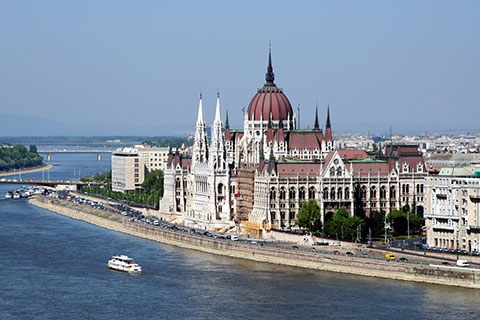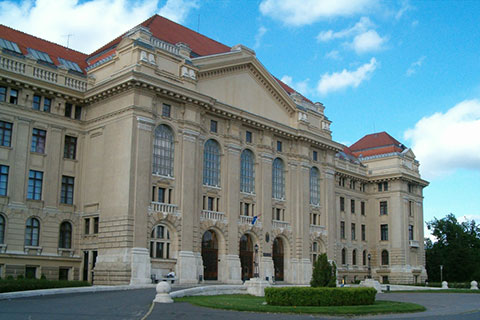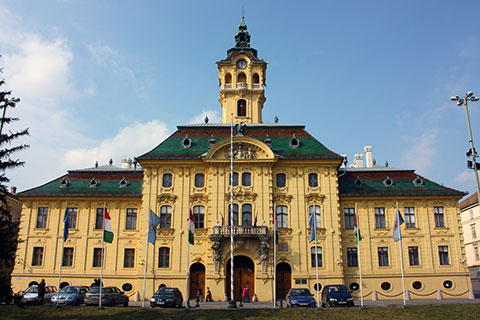
Study in Hungary
Last edited on 23 Feb 2026
Hi! Üdv Magyarországon!
Hi! Welcome to Hungary!
Safe and friendly living and learning environment, Favourable cost to value ratio, affordable living costs, One of the 15 most popular tourist destinations in the world, vibrant international student environment
Higher Education System
Bachelor degree 3-4 years, Master's degree 1-2 yrs, Doctorate course (PHD/DLA 2+2 yrs), Partial studies 3-10 months
For more information visit our website: http://studyinhungary.hu/study-in-hungary/menu/studying-in-hungary/higher-education-in-hungary.html
Universities in Hungary
Student Cities in Hungary
Budapest

Split in two halves (Buda and Pest) either side of the Danube River, and known for its attractive architecture, Budapest is undoubtedly one of Europe’s most aesthetically appealing cities. The city’s architectural and historic importance has earned it a place on the UNESCO World Heritage list, where it is described as “one of the world’s outstanding urban landscapes”.
Budapest doesn’t just look beautiful; it also offers plenty to do and explore, from world-renowned spas, art galleries and classical music, to trendy cocktail bars, bohemian cafés and outdoor clubbing venues. The best-known of Budapest's cultural events is the huge Sziget music festival, held on Óbudai Island in the centre of the Danube every August – but there’s plenty going on all year round.
Three universities in Budapest feature in the QS World University Rankings® 2016/17 – Eötvös Loránd University (ranked 601-650), Corvinus University of Budapest (701+) and new entry Budapest University of Technology and Economics (also 701+). All three participate in Erasmus and various other student exchange programs. Other universities in Budapest include Budapest Business School,Hungarian University of Fine Arts, Semmelweis University (medical), Óbuda University (technical) and Central European University, a postgraduate-only institution which ranks in the global top 50 for politics.
Debrecen

Debrecen is Hungary’s second-largest city, although far smaller than Budapest, with 205,000 residents compared to the 1.7 million residents of the capital. Debrecen has briefly been the capital city of Hungary during two periods of history; the Hungarian revolution in 1848 and the end of World War Two in 1945. The city is the administrative, economic, educational, scientific and cultural center of the eastern region of the country, and the usual range of activities are available, including theater, live music, nightclubs and (in true Hungarian style) natural hot springs and spas. The city is also well known for its lively festivals, including the Flower Carnival in August, which involves millions of flowers being used to decorate a procession of floats.
Szeged

Hungary’s third-largest city, Szeged is located in the south of the country on the banks of the river Tisza. It’s nicknamed the ‘city of sunshine’, due to its warm climate and high number of sunny days. Szeged is also known as a cultural hub, and especially for its Open Air Festival, showcasing outdoor theater performances throughout the summer. Szeged is a university town with a good nightlife, and it’s an ideal choice for foodies, offering great local and traditional food, including salami and fisherman's soup (halászlé). The education center of south Hungary, Szeged is home to the highest ranked university in the country – the University of Szeged.
Application, Fees and Visas in Hungary
Student visas for Hungary
Third country nationals are required to have a visa for entering the territory of Hungary and also for a stay of up to 90 days within a 180 days period if they come from a country that is under visa obligation according to the Schengen acquis. It is worth to check, if your country has a bilateral agreement with Hungary, because in this case there is no need of getting a visa. The visa application has to be submitted to the Hungarian Consulate in the country where the permanent or temporary residence of the applicant is located or in the country of the applicant’s nationality.
If third country nationals wish to stay longer than three months, they need to have a valid travel document, the necessary permits for return or continued travel and they should be able to verify the purpose of entry and stay. They should have both accommodation and enough financial resources to cover their costs plus a full healthcare insurance or sufficient financial resources necessary for taking out healthcare services. A residence permit authorizes third-country nationals to reside in Hungary for a period of minimum 90 days but not exceeding two years. The application for a residence permit should be submitted to the Hungarian Consulate in the country where the permanent or temporary residence of the applicant is located or in the country of the applicant’s nationality and will be judged by the competent Hungarian regional directorate. Those already residing in Hungary can submit their application directly to the competent regional directorate.
Students who are third-country nationals can obtain a residence permit if they have full time legal student relationship with a registered Hungarian public educational institution working in line with the public education information system. The same rules are applied in the case when third country nationals wish to stay in Hungary in order to carry on full time studies organized by a state-recognized higher education institution, or to participate in a preparatory course for studies organized by a state-recognized higher education institution and can prove to meet the language skill requirements.
Researchers can get a residence permit when their purpose of stay is to carry out a research project under a hosting agreement concluded with a research organization accredited in line with specific legislation.
For citizens of third countries, the Immigration Office issues a new biometric document, the EU Blue Card, a work permit and a residence permit enabling highly-skilled non-EU citizens to work and live EU-wide. The EU Blue Card is valid for a period of minimum 1 year and maximum 4 years. After 4 years, the card can be renewed for another 4 years. Blue Card holders are granted the same social and labour rights as the citizens of the receiving country.
Since 1st January 2014 as a result of law changes a single application procedure aims the authorization of the establishment of a legal employment relationship of the third-country nationals with a specific employer in the territory of Hungary on the basis of his application for more than ninety days.
The single permit is a residence permit, which entitles the third country national to establish residence and legal employment relationship with a specific employer in the territory of Hungary.
Cases of single application procedures:
In case the stay of the third country national submitting an application for residence permit for gainful activity aims the establishment of a legal employment relationship with a specific employer;
In case the third-country national intends to establish a legal employment relationship, and he/she submits a residence permit application for family reunification, or submits an application for EU Blue Card;
In case the third-country national intends to establish a legal employment relationship, and he/she is in possession of a residence permit issued for family reunification, or is in possession of an EU Blue Card.
Tuition Fees
Compared to the rest of Western Europe, tuition fees in Hungary are very affordable.
Tuition fees vary depending on the selected university and study programme but below you will find a starting point for your further studies and an opportunity to see the bigger picture. To obtain accurate information regarding tuition fees visit the website of the chosen university.
Most institutions require the tuition fees to be paid before enrolment.
Funding options
Those who want to find funding options as self-financed students can take student loans with a favourable interest rate from the Hungarian Student Loan Centre.
To apply you need to be under 40 years of age and must hold a permanent residence or immigration card. To help with repayment of the loan, an incomebased repayment scheme is available. This means that the amount of money a student needs to pay back and when it needs to be repaid depends on how much the student is earning.
Another option to fund your university studies is to get a student job through student-job agencies. According to Hungarian law a student is entitled to have either a full-time (8 hours) or a part-time job (4 or 6 hours), however scholarship contracts may control the conditions under which a student can work. The minimum wage for unskilled work for 8 hours per day is around 430 EUR while the salary is approximately 560 EUR for skilled jobs.
More information:
http://studyinhungary.hu/study-in-hungary/menu/studying-in-hungary/tuition-fees-and-funding-options.html
Fast facts
- 30,000 international students studying in Hungarian
- Foreign students can study in Hungary with different scholarships such as Stipendium Hungaricum Programme, Erasmus + Programme, CEEPUS and many more.
- The first Hungarian university was the University of Pécs, founded in 1367.
- As a student, you can enjoy discounts in the whole country with your student ID card.
- Concerning accommodation, you can choose between numerous options such as dormitories, student residences or even rents in available prices.
- If you are the citizen of the European Union, you can request an international social insurance card (EHIC).
- According to the EF EPI 2019 statistics, Hungary is among the top 15 countries concerning the number of English speakers in the world.
- In 2020, seven Hungarian universities are listed on the Quacquarelli Symonds (QS) World University Ranking, which is one of the most influential university rankings in the world.
- Apart from Budapest, there are several university towns in the country such as Debrecen, Miskolc, Szeged, or Pécs and many other.
- You can join the Alumni Network even after your arrival in Hungary and you can get access to social events, alumni meetings and online services.
Safe and friendly living environment might be the important aspects while deciding which country you would like to spend your time for study. Thousands of students from all around the world apply for higher educational studies in Hungary each year. If you agree, Hungary is the right place for you. Furthermore, favorable cost-to-value ratio and affordable living costs is definitely a “go”. Don’t you forget to have fun while pursuing you Bachelor, Master or even PhD degree. Hungary is one of the 15 most popular tourist destinations in the world with a capital regarded as one of the most beautiful cities.
No doubt for the education quality as you may know famous Hungarian innovations such as computer, diesel engine, helicopter, safety match and many more. Scholarships? Yes! Find more information on Study in Hungary
Stipendium Hungaricum Scholarship
Focus Scholarship: Bachelor, Master, One-tier master (both the bachelor and the master level of studies), Doctoral and non-degree programs (preparatory and specialisation courses)
Competition: Developing Countries
Scholarship Coverage: Full Scholarship
Established by the Hungarian Government in 2013, the Stipendium Hungaricum programme offers a wide range of courses for international students and it aims to strengthen the international relations of the academic and research community. The programme covers all the tuition fees of your Hungarian studies, while travelling and accommodation costs are also supported. It is available on five continents in approximately 70 countries. In 2019, more than 9 000 Stipendium Hungaricum students studied in Hungary. Applicants are offered more than 600 full degree programmes and non-degree programmes, covering all higher education fields at all degree levels.
Criteria
- Enrolled in the study program and university that is listed as scholarship’s partner
- Students shall have a level of English proficiency required by the Host Institution.
- Not available for Hungarian citizens (including those with dual citizenships)
- Not available for former Stipendium Hungaricum Scholarship Holders, who are re-applying for studies in the same cycle of education
Erasmus +
Erasmus+ programme is the European Union’s programme for education, training, youth and sport. It aims to equip European citizens with the education, skills and creativity that they need in a knowledge-based society. The programme provides opportunities for over 4 million Europeans within the Erasmus + programme countries. The programme also supports over 125,000 institutions and organisations to work with peers in other countries to innovate and modernise teaching practice and youth work.
CEEPUS
CEEPUS is a mobility scholarship programme which supports student and teacher exchanges, the organisation of summer schools, special courses and student excursions. The programme aims to develop long-term academic co-operation between partner institutions within the participating countries in Central and South-East Europe. The funding of the programme is provided by the CEEPUS partner countries. Students receive their CEEPUS grant from the host country; therefore, the amount is tailored to local living standards.
Bilateral State Scholarships
Focus Scholarship: Scientific and Educational cooperation agreements
Scholarship Coverage: Full Scholarships
Bilateral state scholarships are based on scientific and educational cooperation agreements signed by the governments of two countries. You can apply for bilateral state scholarships in two ways: by being nominated by the home country or by submitting an individual application. There are numerous available scholarship types on all levels (bachelor, master and doctoral) from partial studies to full degree studies. Also, you can apply for short or long term study visits (3 days - 10 months) or to summer courses (2-4 weeks). Scholarship holders are entitled to participate in courses free of charge, as well as to receive a stipend.
Hungarian Diaspora Scholarship
Focus Scholarship: Individuals living in Hungarian diasporas outside of Europ
The Hungarian Diaspora Scholarship was established by the Hungarian Government for those individuals living in Hungarian diasporas outside of Europe who wish to study in the Hungarian higher education and want to strengthen their personal and cultural attachment to Hungary. The programme gives opportunity for the scholarship holders to have a professional advancement in the high-quality Hungarian higher education and to improve and broaden their Hungarian language skills.












